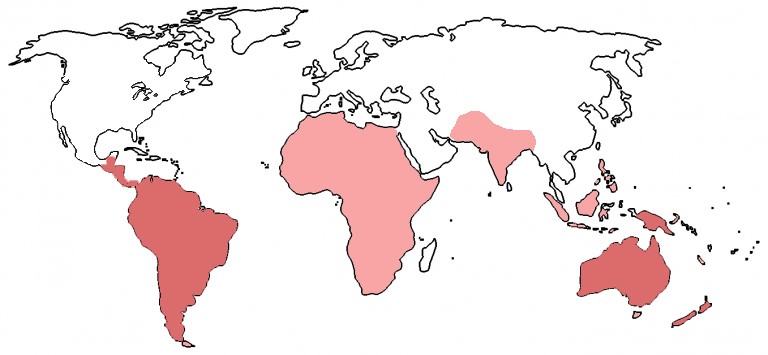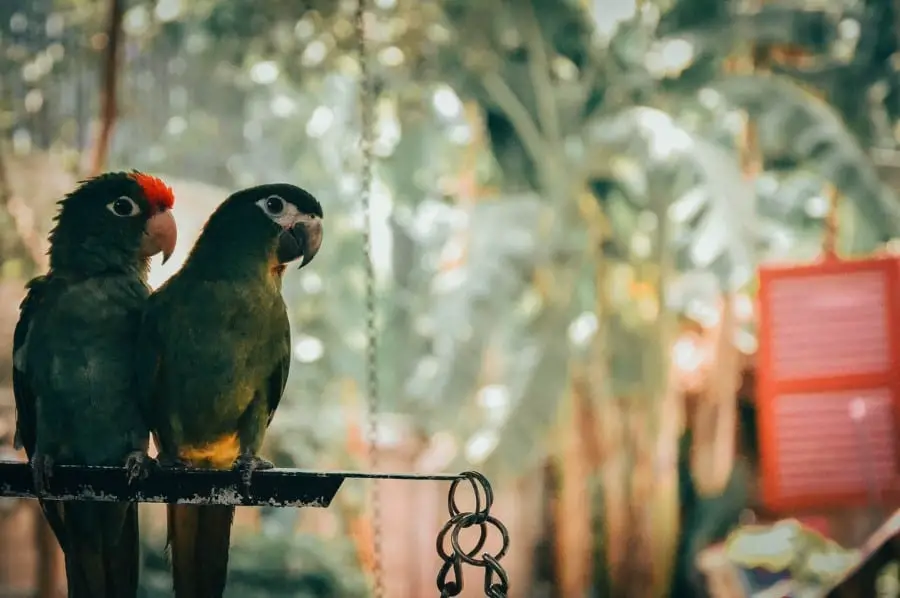For most of the world, Parrots are not a common sight in the wild. They’re only native to certain warm climates. So for many, they would not know if releasing a Parrot into the wild would be a good or bad thing. IT’s one of those occasions where ignorance is indeed bliss.
So let’s explore this a little further for those who do not know what the answer would be. But first, here’s the quick take away answer, then we’ll dive into some of the nuances about this subject.
Can a Parrot survive in the wild? The chances of a Parrot surviving in the wild is low. Domesticated Parrots have no training and a lack of experience and knowledge in the practices required to survive in the wild. For those that might stand a chance, they’d need the right climate, the right conditions and a lot of luck to survive.
Many people looking to take on a parrot as a pet do not realize the size of the undertaking. Parrots are not your average bird, demonstrating a greater level of intelligence and emotion when compared to other birds. For every domesticated bord, it is unlikely they will survive in the wild. But let’s take a look at how Parrots differ from other birds and why surviving would be difficult in particular for them.
Domestic Parrots Hunting Food
Like any bird, if you’ve been keeping a parrot, it will likely never have had to fend for itself. It will never have had to hunt for its own food, would likely not even know where or when to hunt for its own food, or even what that food might look like – as domestic bird/parrot food is often processed.
Domestic Parrots in the Right Place
Parrots are not found the world over, they’re native in particular global regions. There are only specific regions in which a parrot can thrive. Mainly as they’re suited to warm temperature climates and tropical locations.
Here’s a map showing where Parrots are considered native species. This also includes endemic species (which generally means those found in one location or habitat type only) However, I’ve not included those species native to more extreme areas like the alpines. Darker areas have a higher amount of parrot types and population numbers.

Releasing outside of these areas would certainly have additional challenges for your parrot, as well as the challenges outlined below.
Domesticated Parrot Life Expectancy
For the most part, Parrots across the breeds have a life expectancy anywhere between 40 and 75 years and even beyond that. Some have been known to live until 95 years. With a life expectancy lasting that long, you can imagine just from your own lifetime, the number of people they’re likely to meet and the number of experiences they’re likely to go through during all that time.
Domestic Parrots Bonding
Of those years during its lifetime, the number of people that the parrot may need to form new friendships and bonds with will be numerous. Each time can bring an element of distress to the creature. Therefore, it’s important to give adequate thought as to what we would want to put that parrot through over the course of its lifetime.
People who look at taking a parrot on as a pet, often fully understand the bonds and friendship that comes with having the parrot as a full-time companion. Not to mention the (potentially) life long care the person will need to provide for the bird.
If considering this course then there are a few serious points you need to consider
- Noisy – Parrots can be noisy and Loud
- Messy – Parrots out of a cage can be messy – for obvious reasons
- Demanding – They need almost constant care and attention
- Constant – They will be with you quite possibly for life.
What Happens If You Release a Parrot Into the Wild
If you were to release a Parrot into the wild, particularly one that was not suited to the climate, there are a number of challenges the Parrot will face.
Unknown Dangers
When in captivity as a pet, Parrots are largely protected from outside dangers. Their human carers will ensure they are not put into positions and circumstances that might endanger them. Therefore, their experience of these dangers is unknown and they’ve neither had a chance to learn this from their parents or peers or had the benefit of their own experience from birth.
This means other birds, creatures and even humans they encounter may be a danger and they may not even realize it. For this reason, they may perish at the hands of the simple brutality of nature. Add to this that other flocks of birds, be they a flock of parrots or other predator types, may look to hunt down the parrots for food.
Having said that, there is evidence to suggest that many birds of prey will not prey on Parrots due to the dangers faced from their hooked beak – which can potentially break their legs in an encounter.
Sourcing Food
This point may be obvious, but it matters. As domestic Parrots have been hand reared, they have had their food provided for them on a constant basis. There are foods they’re familiar with and hunting has not been something they’ve had to learn.
Because of this, the Parrot is unlikely to instinctively know how to hunt and forage for food, they may also not automatically know what foods they can or can’t eat. Plus they will not have sufficient time to learn, they will need to eat within a day or so in order to survive. The likelihood is they will ultimately starve.
Shelter
Parrots may not know the best places to shelter, where the safe places are, in fact, they probably would not know what was safe or unsafe at all. They may not realize they could find what seems like perfect shelter but it happens to be next to a Fox den, which might put them in danger – they simply have inadequate experience of such dangers.
Distress
Quite possibly the most important and saddest of all the aspects a Parrot will need to face. That of a complete change in environment, friendships, places, and routines. These are enough to distress the parrot into a state of depression and immobilization.

Could Parrots Survive in the Wild?
If circumstances are right then it is possible they can survive. If the climate is right, if they’re young enough and understand how to hunt and find food and shelter, if they are not killed by a local flock and possibly could integrate with a local flock. However, the chances of this are very VERY slim.
What Should You Do?
If you happen to have a parrot that you’ve mistakenly taken on and now feel it was a bad idea. The chances are that releasing it into the wild, however well-intentioned, is actually the worst thing you can do. You are likely committing the parrot to certain death.
If you’re in this position then the first thing to realize is that there’s no shame in it. Many many people take on a Parrot with the best of intentions, and simply don’t realize the huge undertaking and responsibilities that come with it until it’s too late.
The very best course of action is to contact one of the numerous Parrot sanctuaries that exist. They will be able to advise you on what to do and in most cases will arrange to help take the parrot from you to be cared for in the proper environment. This is most often for free, but it’s advisable to provide some form of goodwill donation if possible, as many of these organizations, although free at the point of delivery, are rarely funded.
What If I Find a Parrot?
If you find a parrot that you suspect does not belong in the open, or that appears to be in distress, then it’s better to do something than nothing, even if it turns out you’re wrong about the Parrot’s situation. So, perform a quick search on Google for a Parrot Sanctuary near you and they will advise you of the possible causes and the correct actions to take.
To Close…
From our own perspective, we would go as far as to implore you NOT to release any bird pets into the wild. They simply haven’t been raised in that kind of environment and therefore the likelihood is they will simply not survive. So, perform this search on Google for a parrot Sanctuary near you, and do it the right way.
